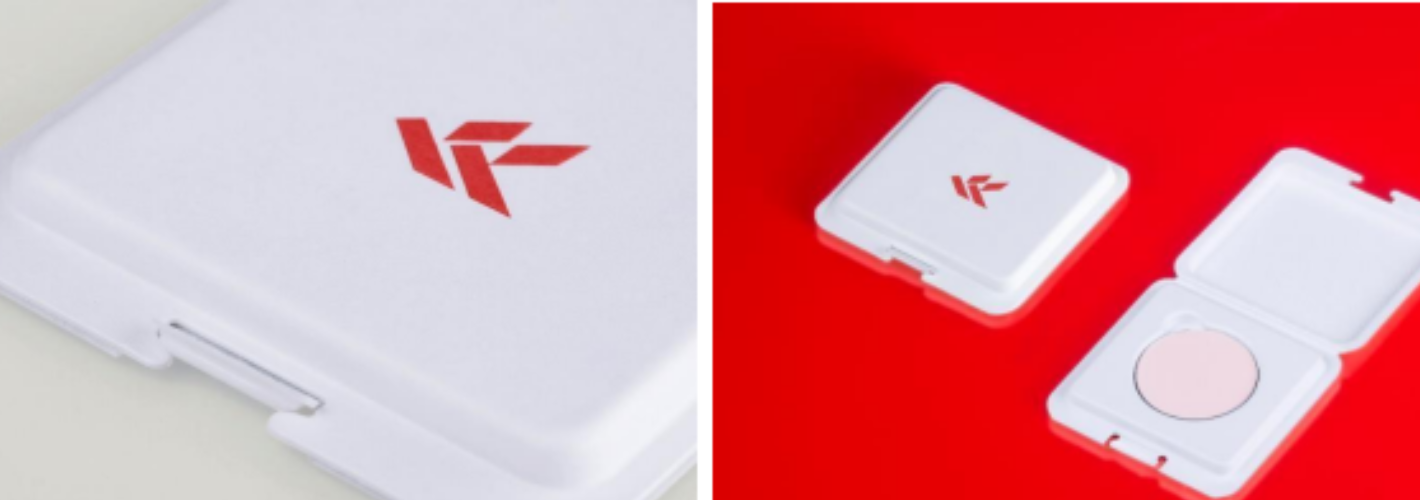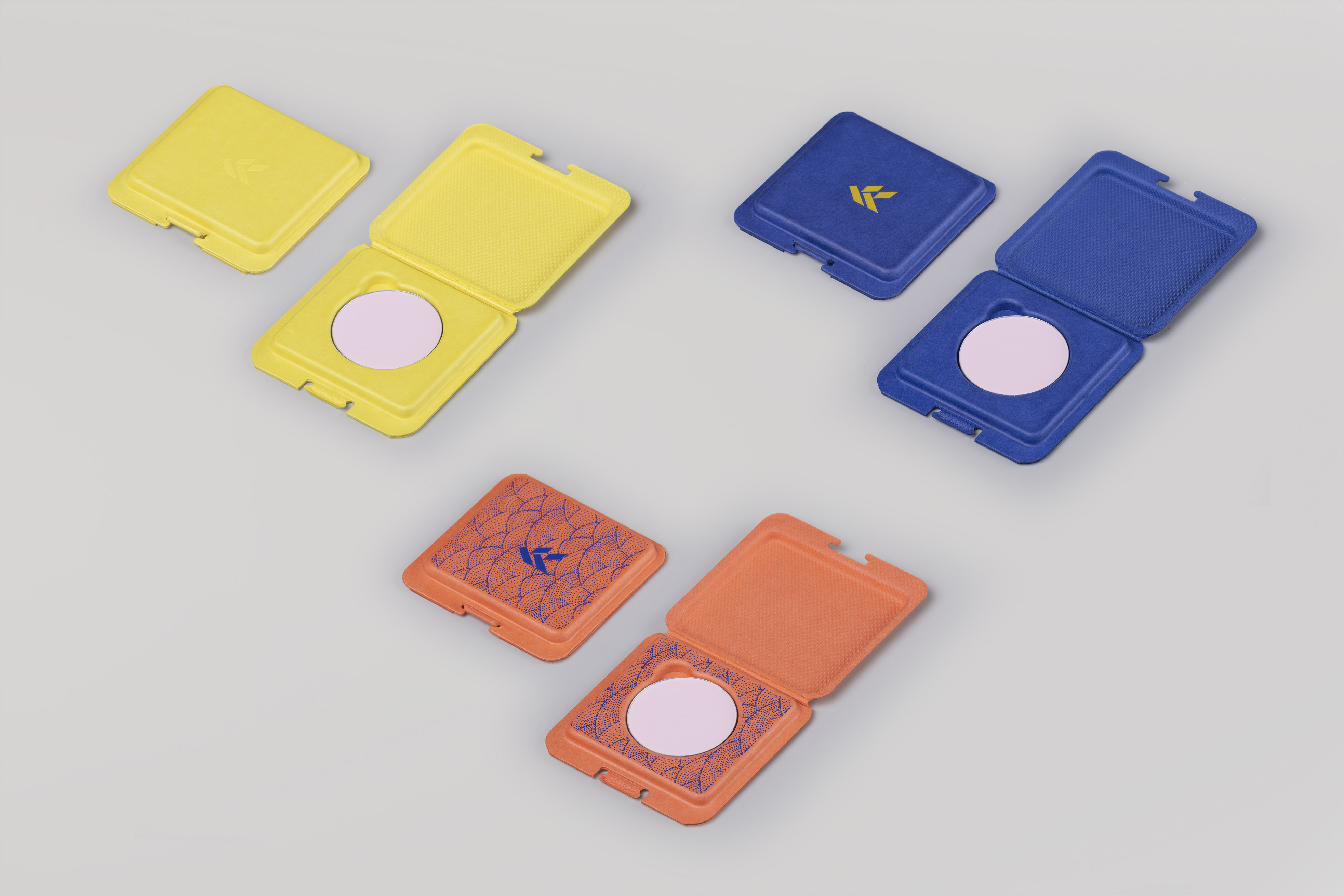Friday, September 26, 2025
The Knoll Ecoform molded pulp refill with tab closure

Knoll Ecoform Molded Pulp Refill with tab closure brings sustainable innovation to the beauty industry through a plant-based, fully recyclable molded pulp compact. Its distinctive three-panel design ensures a premium appearance across all visible surfaces. A precision-engineered tab closure adds durability and reusability—rare in molded pulp packaging—while allowing the compact to remain flat for effective merchandising. Customizable branding enhances shelf appeal. Designed for refill systems, it promotes circularity, reduces plastic waste, and offers a high-end, plastic-free alternative without compromising aesthetics or functionality.
DESIGN
- Refillable design: By supporting cosmetic refills, the compact reduces single-use waste and encourages sustainable consumption. Brands can implement refill programs that extend the product’s lifecycle, offering both environmental and economic benefits.
- Functional aesthetics: The sleek, flat profile combines a premium look with practical utility, ensuring strong performance in both everyday use and retail merchandising.
- Customization for brand longevity: With options for pad printing, embossing, and color customization, the compact allows high-end beauty brands to reinforce their identity without sacrificing sustainability. This fusion of style and eco-consciousness supports long-term product relevance and consumer appeal.
MATERIAL REDUCTION
The Knoll Ecoform Molded Pulp compact demonstrates a significant reduction in raw material usage and introduces innovative, low-impact materials that greatly minimize environmental harm compared to traditional beauty packaging.
Reduction and replacement of raw materials: Conventional beauty compacts often use ABS or PET plastic, metal hinges, and mirrors—components that are resource-intensive, difficult to separate, and largely non-recyclable. In contrast, the Ecoform compact is made entirely from renewable plant-based fibers such as bamboo, wood, and sugarcane. These biodegradable materials eliminate the need for fossil-fuel-derived plastics and metals, significantly reducing extraction impacts and post-consumer waste.
Reduction and replacement of raw materials: Conventional beauty compacts often use ABS or PET plastic, metal hinges, and mirrors—components that are resource-intensive, difficult to separate, and largely non-recyclable. In contrast, the Ecoform compact is made entirely from renewable plant-based fibers such as bamboo, wood, and sugarcane. These biodegradable materials eliminate the need for fossil-fuel-derived plastics and metals, significantly reducing extraction impacts and post-consumer waste.
- Mono-material simplicity: By using a single molded pulp material throughout, the compact simplifies the recycling process. It is fully recyclable in the paper stream and free from glues, films, or coatings that typically hinder recyclability in standard plastic or mixed-material designs.
- Reduction in weight and emissions: The molded pulp compact is up to 40% lighter than standard plastic compacts, reducing shipment volume and weight. This directly lowers transport-related carbon emissions and fuel use, contributing to a reduced supply chain footprint.
- Efficient manufacturing: Plastic compacts require multiple injection molds and assembly steps. The Ecoform design uses a single steel mold to form the compact in one press cycle, reducing energy consumption, tooling complexity, and production waste. Together, these innovations position the Ecoform compact as a low-impact, high-efficiency packaging solution, setting a new sustainability benchmark in the beauty industry.
PRODUCTION PROCESS
The production process for the Knoll Ecoform Molded Pulp compact is designed for minimal environmental impact through efficient resource use, clean technology, and waste reduction strategies.
- Resource efficiency: The compact is manufactured using a wet-press molded pulp process, which optimizes water and energy use. The process forms all parts of the compact in a single mold cycle, reducing the need for multiple production steps, tooling, and assembly, unlike traditional plastic packaging.
- Use of renewable materials: Only renewable, plant-based fibers—bamboo, sugarcane, and wood—are used, sourced responsibly. No petroleum-based materials, metals, or composites are involved, reducing environmental impact from material extraction.
- Clean production technologies: The molded pulp process uses steel molds and low-heat drying systems, which consume less energy compared to plastic injection molding. The absence of adhesives or coatings further reduces emissions and chemical runoff.
- Waste minimization: Production is designed to minimize offcuts and scrap. Any pulp waste generated during molding is collected and reintegrated into the production cycle, ensuring near-zero material waste.
- Reduced emissions and transportation impact: The compact’s lightweight design reduces the energy required for transport and lowers greenhouse gas emissions across the supply chain.
SUPPLY CHAIN
The Knoll Ecoform Molded Pulp compact optimizes logistics and supply chain efficiency to significantly reduce environmental impact across transportation and distribution.
- Lightweight construction: The compact is up to 40% lighter than conventional plastic alternatives, directly reducing fuel consumption and greenhouse gas emissions during transport. This weight reduction also lowers shipping costs and energy use throughout the supply chain.
- Efficient shipping format: The compacts are designed for flat or nested shipping, maximizing the number of units per shipment and minimizing packaging volume. This reduces the number of shipments needed and improves space efficiency in warehousing and retail storage.
- Collaborations with sustainable carriers: Knoll partners with logistics providers that prioritize environmentally responsible practices, such as using fuel-efficient fleets, route optimization software, and carbon-offset programs.
- Regional manufacturing capabilities: Where possible, production is localized to reduce transit distances between manufacturing sites and customer locations, cutting down on transport emissions and lead times. Together, these optimizations create a lean, low-impact logistics model that supports Knoll’s broader sustainability goals while maintaining delivery efficiency and product integrity.
MARKET ADAPTABILITY
The primary market for Knoll Ecoform Molded Pulp packaging is the beauty and cosmetics industry, specifically brands seeking to reduce their environmental footprint. This includes:
- Luxury and premium beauty brands aiming for sustainable yet aesthetically pleasing packaging,
- Indie and clean beauty brands that prioritize eco-friendly practices as part of their brand identity,
- Mass-market cosmetics companies under pressure from consumers and regulatory bodies to reduce plastic waste.
The beauty industry generates 120 billion units of packaging annually, much of which is plastic and non-recyclable. With plastic compacts being among the highest landfill contributors, Knoll identified a major sustainability gap. By introducing molded pulp compacts, specifically designed to deliver a refill product and recyclable in the paper stream, Knoll offers a direct replacement for single-use plastic packaging.
A 2023 Nielsen survey reported that 73% of global consumers are willing to pay more for sustainable packaging, and a McKinsey report noted that 55% of consumers consider sustainability when purchasing beauty products.
Knoll’s solution meets this demand by providing 100% recyclable, plant-based packaging that aligns with eco-conscious consumer values. Major beauty brands (e.g., L’Oréal, Estée Lauder, and Unilever) have committed to reducing plastic usage by 50% by 2025. Knoll’s molded pulp compacts help these brands meet sustainability targets while maintaining premium visual appeal and functionality.
The Knoll Ecoform Molded Pulp compact has a measurable positive impact on the environment by addressing a critical gap in sustainable beauty packaging. As the beauty industry produces over 120 billion packaging units annually—much of it non-recyclable plastic—this product offers an immediate, scalable alternative.
END OF LIFE
The Knoll Ecoform Molded Pulp compact was designed with end-of-life sustainability at its core, ensuring minimal environmental impact through thoughtful material selection, structural simplicity, and compatibility with existing recycling systems.
- Recyclability & biodegradability: Made entirely from renewable plant-based fibers (bamboo, wood, and sugarcane), the compact is 100% recyclable in standard paper streams and also biodegradable if discarded outside formal recycling systems. No added plastics, metals, or coatings mean it can be processed without separation, simplifying disposal.
- Mono-material construction: Its single-material design eliminates the need for disassembly, reducing contamination risks in recycling and ensuring consistent recovery rates. This mono-material approach avoids the complex waste streams associated with traditional plastic compacts that often include mirrors, magnets, and metal clasps.
- Reusable format: The refillable design extends product lifespan, encouraging users to reuse the outer compact multiple times before recycling. This circular use model reduces resource consumption and total environmental footprint.
- Optimized for circularity: From the outset, the compact was engineered to fit into existing waste and recycling infrastructures without requiring new technologies or specialized disposal methods, promoting broad scalability and adoption across markets.
In summary, the Ecoform compact’s end-of-life strategy directly reduces waste, lowers carbon emissions, and supports a circular economy—delivering sustainability from start to finish.
